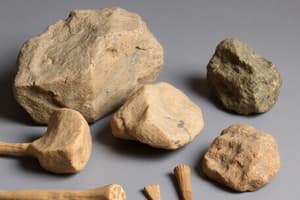Podcast
Questions and Answers
What characterizes the Paleolithic Period of the Stone Age?
What characterizes the Paleolithic Period of the Stone Age?
- Domestication of animals was common.
- It lasted until about 10,000 BCE. (correct)
- People began forming permanent settlements.
- Agriculture began to replace hunting and gathering.
Which development is associated with the Neolithic Period?
Which development is associated with the Neolithic Period?
- Increased use of stone tools.
- Beginning of a nomadic lifestyle.
- Establishment of farming practices. (correct)
- Hunting with the assistance of dogs.
What insight do cave paintings, such as those at Lascaux, provide to archaeologists?
What insight do cave paintings, such as those at Lascaux, provide to archaeologists?
- Evidence of written language development.
- Clues about Stone Age people's hunting practices. (correct)
- Information about ancient architectural techniques.
- Details on the agricultural tools used in farming.
What does the archaeological site of Çatalhöyük indicate about Stone Age communities?
What does the archaeological site of Çatalhöyük indicate about Stone Age communities?
During which period did people begin to utilize dogs in their hunting activities?
During which period did people begin to utilize dogs in their hunting activities?
What type of artifacts do archaeologists examine to understand early human history?
What type of artifacts do archaeologists examine to understand early human history?
How many people are estimated to have lived at Çatalhöyük?
How many people are estimated to have lived at Çatalhöyük?
Which of the following statements about the Stone Age is accurate?
Which of the following statements about the Stone Age is accurate?
What is the primary reason people were nomadic during the Stone Age?
What is the primary reason people were nomadic during the Stone Age?
Which statement best describes the Mesolithic Period?
Which statement best describes the Mesolithic Period?
How did the findings at Çatalhöyük influence our understanding of Stone Age communities?
How did the findings at Çatalhöyük influence our understanding of Stone Age communities?
What does the discovery of stone tools in Jabal Faya suggest about early humans?
What does the discovery of stone tools in Jabal Faya suggest about early humans?
What was a significant transition that occurred during the Neolithic Period?
What was a significant transition that occurred during the Neolithic Period?
What type of lifestyle did people predominantly follow during the Paleolithic Period?
What type of lifestyle did people predominantly follow during the Paleolithic Period?
What role do cave paintings, such as those in Lascaux, play in archaeological studies?
What role do cave paintings, such as those in Lascaux, play in archaeological studies?
What do the artifacts studied by archaeologists, such as stone tools, help them understand?
What do the artifacts studied by archaeologists, such as stone tools, help them understand?
Flashcards
Paleolithic Period
Paleolithic Period
Old Stone Age; characterized by simple stone tools and nomadic hunter-gatherer lifestyle.
Neolithic Period
Neolithic Period
New Stone Age; marked by farming & settled living.
Cave Paintings
Cave Paintings
Ancient art that reveals early humans' rituals, beliefs, and daily lives.
Çatalhöyük
Çatalhöyük
Signup and view all the flashcards
Domestication of Dogs
Domestication of Dogs
Signup and view all the flashcards
Archaeological Artifacts
Archaeological Artifacts
Signup and view all the flashcards
Stone Age Population (example: Çatalhöyük)
Stone Age Population (example: Çatalhöyük)
Signup and view all the flashcards
Stone Age Shift
Stone Age Shift
Signup and view all the flashcards
Mesolithic Period
Mesolithic Period
Signup and view all the flashcards
Jabal Faya Stone Tools
Jabal Faya Stone Tools
Signup and view all the flashcards
Stone Age Nomads
Stone Age Nomads
Signup and view all the flashcards
Stone Age Tools
Stone Age Tools
Signup and view all the flashcards
Importance of Çatalhöyük
Importance of Çatalhöyük
Signup and view all the flashcards
Archaeologist's Role
Archaeologist's Role
Signup and view all the flashcards
Stone Age Artifacts
Stone Age Artifacts
Signup and view all the flashcards
Study Notes
The Paleolithic Period
- Characterized by the use of simple stone tools
- Hominids were hunter-gatherers and nomadic
The Neolithic Period
- Marked by the development of agriculture
- This allowed people to settle in one place and grow crops
Cave Paintings
- Provide insight into the rituals, beliefs, and daily life of early humans
Çatalhöyük
- Indicates that Stone Age communities were complex and organized
- Showed evidence of sophisticated architecture, social structures, and religious practices
Domestication of Dogs
- Occurred during the Paleolithic Period
- Dogs were used for hunting, companionship, and protection
Archaeological Artifacts
- Stone tools, pottery, bones, and other remains
Population of Çatalhöyük
- Estimated population of around 8,000 people
Accuracy Regarding the Stone Age
- The Stone Age was characterized by a dramatic shift in human behavior and development, leading to advancements in toolmaking, food production, and social structures.
The Stone Age
- Early humans lived in the Arabian Peninsula during the Stone Age, as indicated by the discovery of 125,000-year-old stone tools in Jabal Faya, Sharjah.
- People in the Stone Age were nomadic, constantly moving to find food.
- They used stone tools to hunt animals and gather plants for survival.
Periods of the Stone Age
- The Stone Age is divided into three main periods: Paleolithic, Mesolithic, and Neolithic.
- The Paleolithic Period is known as the Old Stone Age (before 10,000 BCE).
- The Mesolithic Period is the Middle Stone Age (between 10,000 and 8,000 BCE) and marked the use of dogs for hunting.
- The Neolithic Period is the New Stone Age (from 8,000 to 4,000 BCE) and saw a shift towards settled living, farming, and animal husbandry.
Understanding the Past
- Archaeologists study artifacts to understand early human history and the Stone Age.
- Common artifacts include stone tools like axes and arrowheads, cave paintings, and buildings.
- These artifacts provide insights into the daily lives, societal structures, and beliefs of Stone Age people.
Cave Paintings
- Cave paintings found in Lascaux, France, date back 17,000 years, featuring horses, deer, and aurochs.
The Importance of Çatalhöyük
- The oldest Stone Age buildings were found at Çatalhöyük in southern Turkey, dating back over 10,000 years.
- These buildings were built close together, indicating a community structure.
- Archaeologists estimate that up to 7,000 people lived in this site.
- Çatalhöyük demonstrates that some Stone Age communities were transitioning towards settled life, setting the stage for the development of towns and cities.
Activity 2: Key Highlights
- Stone tools found in Jabal Faya provide evidence of Stone Age humans in the Arabian Peninsula.
- Archaeologists study artifacts to learn about prehistoric peoples.
- The site of Çatalhöyük reveals a significant shift towards settled life in Stone Age communities.
Activity 3: Timeline
- 123,000 BCE: Stone tools discovered in Jabal Faya.
- 15,000 BCE: Cave paintings in Lascaux created.
- 8,000 BCE: Çatalhöyük buildings constructed.
Studying That Suits You
Use AI to generate personalized quizzes and flashcards to suit your learning preferences.




